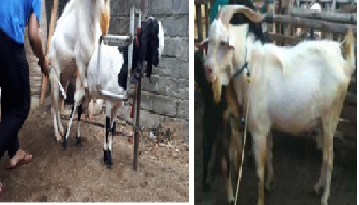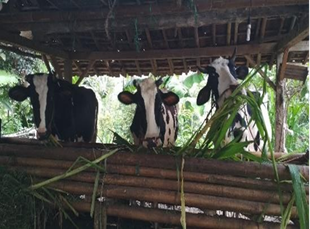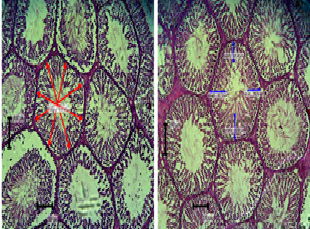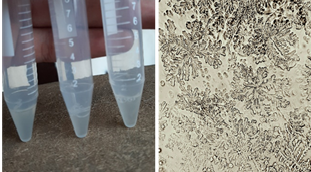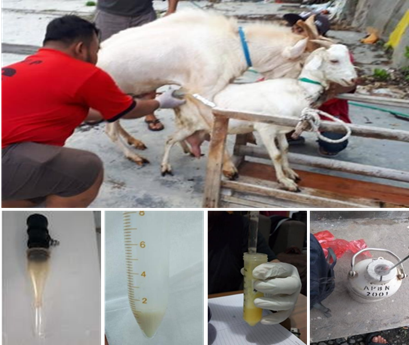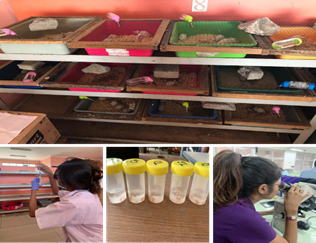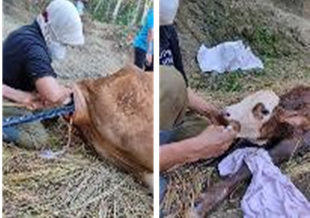Pyometra and mammary gland tumor in a Beagle dog at the Veterinary Teaching Hospital of Brawijaya University, Malang, Indonesia
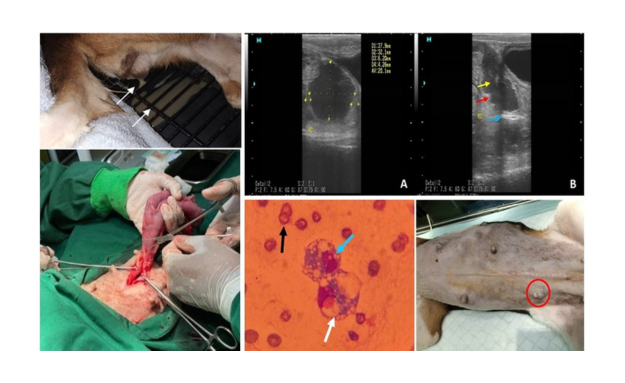
Downloads
A 12-year-old Beagle dog weighing 7.7 kg was brought to the Brawijaya University Veterinary Teaching Hospital in a state of dehydration, lethargy, and jaundice. On the 2nd day of hospitalization, the dog had mucopurulent discharge from the vagina. From the results of a complete blood count and ultrasonography (USG), the patient was diagnosed with pyometra and was treated with an ovariohysterectomy. After surgery the dogs was given cefotaxime 10 mg/kg bw, meloxicam 0.2 mg/kg bw, 0.9 ml vitamin K, and supportive therapy with Biodin® 0.5 mL and Modivitasan® 0.5 mL. Pyometra infection causes progesterone levels to rise, thereby triggering mammary gland tumor. On the 23rd day of hospitalization, a lump was found in the mammary gland. Fine needle aspiration (FNA) results showed the presence of Mott cells. The mammary gland tumor was treated with a single mastectomy. Mastectomy was performed when the dog was in stable condition, about a month after the ovariohysterectomy. Ovariohysterectomy and mastectomy were not performed simultaneously due to consideration of the patient's clinical condition, which made it impossible to get prolonged exposure to anesthesia. Post-mastectomy surgery the dogs were given cefixime 10 mg/kg bw, the analgesic meloxicam 0.2 mg/kg BW, and Biodin® 0.5 ml as supportive therapy. The postoperative wound healed well without complications. The patient recovered after one month of treatment.
Baithalu RK, Maharana BR, Mishra C, Sarangi L, Samal L. 2010. Canine pyometra. Vet World 3: 340-42.
Benavente A, Bianchi A, Aba M. 2016. Canine mammary tumors: Risk factors, prognosis and treatments. J Vet Adv. 6: 1291-300.
Ettinger SJ, Feldman EC. 2010. Textbook of veterinary internal medicine: Diseases of the dog and the cat. 7th Ed. Elsevier Saunders, St. Louis, MO, US.
Fesseha H. 2020. Mammary tumours in dogs and its treatment option - A review. Biomed J Sci & Tech Res. 30: 23552-61.
Fossum TW. 2019. Small animal surgery. 5th Ed. Elsevier. USA.
Gobello C, Corrada Y. 2001. Canine mammary tumors: An endocrine clinical approach. Small Anim. 23: 705-10.
Goldschmidt M, Peña L, Rasotto R, Zappulli V. 2011. Classification and grading of canine mammary tumors. Vet Pathol. 48: 117-31.
Hagman R. 2018. Pyometra in small animals. Vet Clin North Am Small Anim Pract. 48: 639-61.
Kim WS, Song KH, Bae H, Yu D, Song JH. 2022. Mott Cell Differentiation in Canine Multicentric B Cell Lymphoma with Cross-Lineage Rearrangement and Lineage Infidelity in a Dog. Vet Sci. 9: 549.
Maiti SK. 2017. Canine cancer. New India Publishing Agency. India.
Nelson RW, Guillermo Couto C. 2019. Small animal internal medicine. 6th Ed. Elsevier Health Sciences. The Netherlands.
Patrick A. 2016. Pola kejadian pyometra pada anjing di Rumah Sakit Hewan Pendidikan Fakultas Kedokteran Hewan Universitas Airlangga. Skripsi. Universitas Airlangga. Surabaya. Indonesia.
Rickyawan N, Virgiantari CW, Lesmana MA, Vidiastuti D. 2022. Surgical procedure for pyometra and mammae tumor treatment in a Pitbull dog. J Medik Vet. 5: 109-18.
Sartini S, Berata IK, Supartika IKE. 2015. Histopathology of mammary tumor metastases in dogs through blood and lymph vessels. 4: 419-27.
Scott MA, Stockham SL. 2013. Fundamentals of veterinary clinical pathology. 2nd Ed. John Wiley & Sons, New Jersey, US.
Valdivia G, Alonso-Diez Á, Pérez-Alenza D, Peña L. 2021. From conventional to precision therapy in canine mammary cancer: A comprehensive review. Front Vet Sci. 8: 623800.
Copyright (c) 2023 Nofan Rickyawan, Dian Vidiastuti, Karlina Karlina, Shelly Kusumarini

This work is licensed under a Creative Commons Attribution-ShareAlike 4.0 International License.
Ovozoa by Unair is licensed under a Creative Commons Attribution-ShareAlike 4.0 International License.
1. The journal allows the author to hold the copyright of the article without restrictions.
2. The journal allows the author(s) to retain publishing rights without restrictions
3. The legal formal aspect of journal publication accessibility refers to Creative Commons Attribution Share-Alike (CC BY-SA).
4. The Creative Commons Attribution Share-Alike (CC BY-SA) license allows re-distribution and re-use of a licensed work on the conditions that the creator is appropriately credited and that any derivative work is made available under "the same, similar or a compatible license”. Other than the conditions mentioned above, the editorial board is not responsible for copyright violation.





























